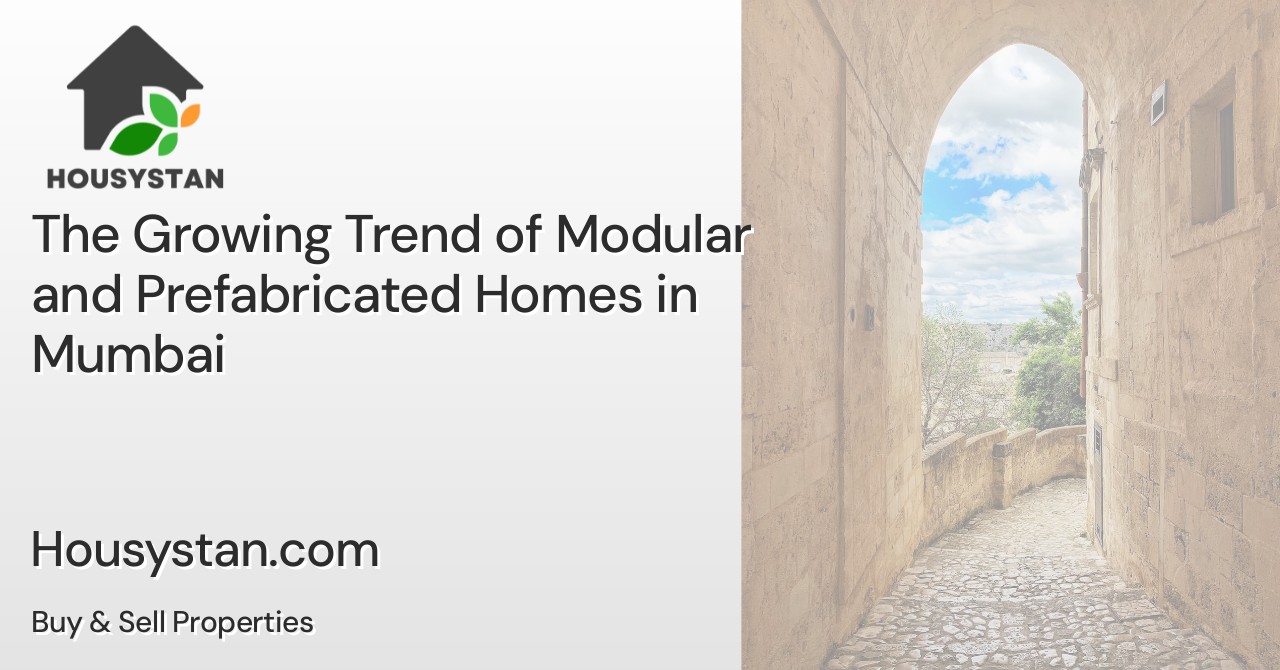The Growing Trend of Modular and Prefabricated Homes in Mumbai
Read latest blogs and articles from Housystan

The Information mentioned here was last updated on:
29/1/2026Introduction: A New Wave in Mumbai's Housing Market
Mumbai, the city of dreams, has long been known for its fast-paced lifestyle and vibrant culture. Yet, for many, finding a home that is both affordable and desirable within this bustling metropolis poses a significant challenge. However, a growing trend is reshaping Mumbai’s real estate landscape: modular and prefabricated homes. These innovative housing solutions are gradually capturing the interest of Mumbaikars for various reasons—from their cost-effectiveness to their rapid construction and eco-friendliness.
Understanding Modular and Prefabricated Homes
- Verified Tenants/Buyers
- Unlimited Property Listing
- Zero subscription/charges fee
To appreciate the appeal of modular and prefabricated homes, it’s essential to understand what they are. Unlike traditional homes, which are constructed entirely on-site, modular and prefabricated homes are built off-site, in sections, and assembled at the desired location. This process can significantly reduce construction time and cost while maintaining, if not improving, construction quality.
Modular Homes
Modular homes are constructed in sections at a factory or a manufacturing facility. These sections, or modules, are then transported to the home’s location, where they are fitted together like building blocks. The entire assembly takes place on a foundation, just like more conventional homes. This method not only speeds up the building process but also allows for greater customization.
Prefabricated Homes
Prefabricated homes, or prefab homes, encompass various construction types, including modular, panelized, and even tiny homes. Prefab homes are built in a controlled environment, allowing for precise construction irrespective of weather conditions. These homes can vary in style and size, catering to different needs and tastes.
Why Mumbai is Embracing These Innovations
The idea of modular and prefabricated homes gaining traction in Mumbai can be linked to several compelling factors:
Affordability
Housing prices in Mumbai have skyrocketed over the years, making it nearly impossible for the average person to afford a home in the city. Modular and prefabricated homes offer a more affordable alternative. The cost per square foot of a modular home tends to be lower compared to traditional homes, primarily due to the efficiency and mass production of the construction process.
Speed of Construction
In a city where time is money, the rapid construction speed of modular and prefabricated homes is a significant advantage. Traditional construction in Mumbai can take several months, if not years, to complete. In contrast, modular homes can be constructed and assembled in a fraction of that time, ranging from a few weeks to a couple of months. This speed not only reduces labor costs but also allows residents to move in faster.
Environmental Benefits
Mumbai is no stranger to environmental challenges, and prefabricated homes offer a sustainable solution. The controlled construction environment results in less waste, and materials used in prefab homes are often more environmentally friendly. Additionally, these homes are designed for energy efficiency, contributing to lower utility bills and a reduced ecological footprint.
The Design and Customization Appeal
Despite the perception that modular and prefabricated homes may lack personality, they offer a surprising amount of flexibility in design and customization. Buyers can choose from numerous layouts, finishes, and features to create a home that meets their tastes and lifestyle requirements. Furthermore, as architects and designers become more involved in this sector, the aesthetic and functional potential of these homes continues to expand.
Challenges and Misconceptions
Despite their growing popularity, modular and prefabricated homes also face some challenges in Mumbai’s market.
Placement and Land Availability
One of the most significant hurdles is finding suitable land for these homes. Land in Mumbai is both limited and expensive, which can restrict the placement of even the most cost-effective prefab homes. This challenge necessitates innovative solutions from city planners and real estate developers to integrate these homes effectively into Mumbai’s urban landscape.
Perception Issues
There remains a lingering misconception that modular and prefabricated homes are less durable or lower quality than traditional homes. This outdated perception can deter potential buyers. However, with advancements in technology and construction methods, these homes often exceed conventional building standards, offering durability and longevity.
The Role of Government and Developers
The government and real estate developers play a crucial role in fostering the adoption of modular and prefabricated homes in Mumbai.
Government Initiatives
Government policies and incentives aimed at promoting sustainable and affordable housing can significantly boost the modular housing sector. Initiatives such as tax breaks or rebates for eco-friendly buildings might encourage more people to consider these options.
Developers Pushing the Envelope
Forward-thinking developers are key to this industry’s growth. By offering a diversified portfolio of modular and prefab homes, developers can attract a broader range of buyers, from first-time homeowners to those looking to downsize. Collaboration between developers and manufacturers can also lead to innovations that further enhance the appeal of these homes.
The Future Outlook for Mumbai's Housing Scene
The momentum in favor of modular and prefabricated homes is likely to continue. As land prices soar and traditional construction struggles to keep pace with demand, these homes provide a viable solution that aligns with the contemporary needs of Mumbai residents. Furthermore, as awareness and acceptance grow, the market has the potential to evolve and innovate.
In conclusion, Mumbai is on the cusp of a housing revolution, with modular and prefabricated homes offering fresh possibilities. The combination of affordability, speed, and sustainability meets the pressing needs of urban living while ensuring that dreams of owning a home in this dynamic city remain within reach for more people. As these homes become increasingly popular, they could very well redefine how Mumbai approaches housing in the years to come.